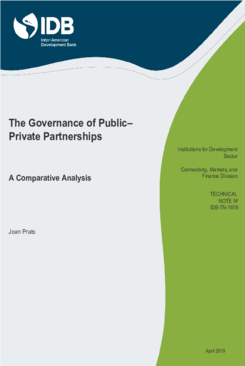The Governance of Public-Private Partnerships: A Comparative Analysis
Date
Mar 2019
There is growing interest in promoting public–private partnerships (PPPs) as an instrument to develop more and better infrastructure. Good governance for PPPs is a key aspect of promoting appropriate projects and avoiding policy errors and associated fiscal costs. This paper defines good PPP governance and analyzes the functional organization of the PPP project cycle in Latin American and Caribbean countries from a comparative perspective, identifying two stylized governance models. Centralized models are common in more unitary states and are characterized by the central role played by a designated PPP unit, while decentralized models are more typical in federal or decentralized countries and depend more intensively on line ministries and public developments banks. We also identify the main incentives and conflicts of interest inherent in each governance model, and the organizational devices to mitigate them. Finally, we conclude with some general principles for good governance.



